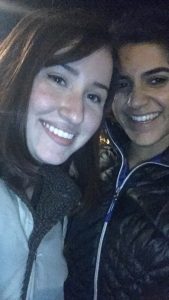Mary Cait Phalen is a Veterinary Science and Biomedical major with minors in Avian Science and Spanish in Schreyer Honors College at Penn State. She hopes to one day become a large animal and avian veterinarian and work in South America to help countries in the continent improve their vet care. More importantly, or rather closer to my heart, she is one of my best friends from high school and we have remained close throughout college.This summer she ventured to Belize with the organization C.E.L.A. Belize and took part in their large animal veterinary practice program.
I chose to interview Mary Cait for this Oral History Project because her trip shared many similarities but also some key differences with the Nicaragua CCESP. I wanted to get a sense of what she gained from her experience but also how it has impacted her now and for her future. I also wanted to see how her veterinary experiences might be transferrable to my future experience working in rural health. The full audio and transcript is available on a second page but I have included some quotes and stories below of the work she did and her reflections during and after her trip.
Mary Cait’s Projects
While in Belize, Mary Cait completed two courses: “Large Animal Veterinary Practices in the Tropics” and “Wildlife Health and Conservation”. For the first few weeks of her time there, her group worked with the farms surrounding a small town called San Ignacio where they completed projects like bovine vaccinations and held a few spay and neuter clinic. Her final weeks were spent in the Belize Zoo where she and her group members did clinical sessions with the top veterinarian in the country for oscillates and jaguars as well as worked with researchers on a tapir conservation project.
On Sustainable Community Development Projects
“C.E.L.A. Belize is run by Americans who are now Belizean citizens. They’ve been living down there for 8-10 years so they have great roots in the community. It is very important to the organization that they work only in programs that are community based, so it is the community only helping themselves.”
“If you set up a health clinic, the health clinic dies once you leave because there are no doctors in the town. You need to teach people how to care for things. When we would go out and do veterinary medicine, we wouldn’t just administer care and return the animals. We would tell farmers and their workers, for example, that when giving your own vaccines you have to get through the subcutaneous layer, you can’t just stab through the skin lightly. So the big point of a lot of this work is to make a lasting impact which has to come from a local basis- whether that is teaching people how to care for themselves.”
Although Mary Cait didn’t have a class similar to LACS 20 to prepare her for her trip to Belize, it definitely seemed that she and her group has the same considerations and hesitations about their own trip. It was definitely reassuring to me to hear about how positive her experience was and the entire interview was very enthusiastic on her part.
On Why International Experience Was Crucial
“One of the most important things that I learned was to go to these other countries and giving them the resources that they need, making sure they go to the right people. The vets down there want to change the situation and they could do great things if they had some of the resources that we do in America. Also, helping them with their own projects and making sure that when you leave the projects are continuing to be carried out by the people that you’re giving the money to.”
After speaking to Mary Cait it was very evident that her experience in Belize not only affected her academic and career path, but also her viewpoint on the world. Her interest in working in South America was definitely piqued from her time in Belize and she attributes it to the professionals who she worked with who wanted to make great change, despite their limited resources and finances. She realized that her and her groups presence their provided some relief, if only for a short while, and this has inspired her to make a more sustained effort to help in such causes.
On New Social and Cultural Experiences
“We’ve worked with a monkey forest that was entirely run by community leaders. There is a lot of machisimo left in Latin American countries, which you all will experience in Nicaragua I’m sure, but this monkey farm program was run by the local women and we would go to their organization and work there and make evaluations, then go to them and tell them overall what we thought of the health of their populations were.”
Mary Cait has been a strong personality and unapologetically intelligent and opinionated woman for as long as I’ve known her so I can only imagine what a culture change it would have been for her to be in a culture with so much machismo. The way she talked about this monkey farm reminded me of Mike Boudreau’s Women in Action program with Compas de Nicaragua in the way that an activity can empower women to rise above their circumstances and I know that Mary Cait’s experience at the monkey farm was one of the most positive she had in Belize.
On How Knowing Spanish Improved Her Experience
“Knowing Spanish allowed me to talk to the workers and people who came into the clinic and ask them “what actually is going on with your pet? Do you understand the risks of the surgery they are going under for spay and neuter?” Sometimes animals don’t wake up from anesthesia and to be able to explain these things in a language that they could understand was so important because consent is a huge part of medical care, informing your patient about what is going on, so I found that was really important”
” Knowing Spanish was a really big part of being able to bridge gaps: making sure that people knew what you were doing and how to properly carry out these medical procedures when you were gone.”
One of my biggest anxieties about this trip has been my limited Spanish knowledge so I asked this question a bit selfishly. Mary Cait’s candid response has only inspired me to learn as much Spanish as possible so that I can communicate with and learn from locals on my own.
This Oral History project made me think and ask about Mary Cait’s experience in a way that I did not when I was just being curious as a friend. It was so interesting to see how our different career aspirations and academic interests at very different schools could still be so similar and apply to each other. After hearing all about her experiences, I couldn’t be more excited to embark on my own trip to Nicaragua!


